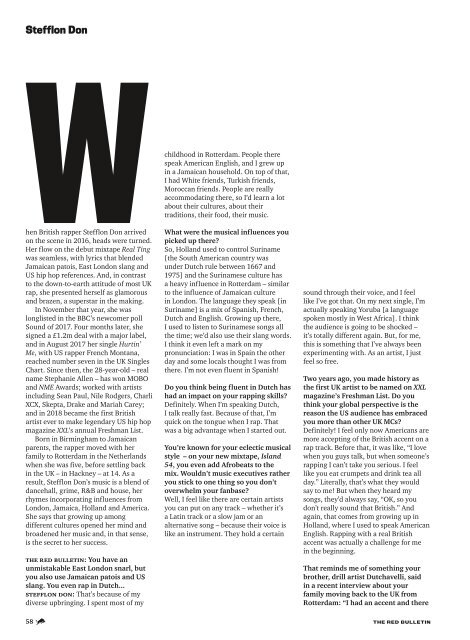The Red Bulletin December 2020 (UK)
- No tags were found...
Create successful ePaper yourself
Turn your PDF publications into a flip-book with our unique Google optimized e-Paper software.
Stefflon Don<br />
When British rapper Stefflon Don arrived<br />
on the scene in 2016, heads were turned.<br />
Her flow on the debut mixtape Real Ting<br />
was seamless, with lyrics that blended<br />
Jamaican patois, East London slang and<br />
US hip hop references. And, in contrast<br />
to the down-to-earth attitude of most <strong>UK</strong><br />
rap, she presented herself as glamorous<br />
and brazen, a superstar in the making.<br />
In November that year, she was<br />
longlisted in the BBC’s newcomer poll<br />
Sound of 2017. Four months later, she<br />
signed a £1.2m deal with a major label,<br />
and in August 2017 her single Hurtin’<br />
Me, with US rapper French Montana,<br />
reached number seven in the <strong>UK</strong> Singles<br />
Chart. Since then, the 28-year-old – real<br />
name Stephanie Allen – has won MOBO<br />
and NME Awards; worked with artists<br />
including Sean Paul, Nile Rodgers, Charli<br />
XCX, Skepta, Drake and Mariah Carey;<br />
and in 2018 became the first British<br />
artist ever to make legendary US hip hop<br />
magazine XXL’s annual Freshman List.<br />
Born in Birmingham to Jamaican<br />
parents, the rapper moved with her<br />
family to Rotterdam in the Netherlands<br />
when she was five, before settling back<br />
in the <strong>UK</strong> – in Hackney – at 14. As a<br />
result, Stefflon Don’s music is a blend of<br />
dancehall, grime, R&B and house, her<br />
rhymes incorporating influences from<br />
London, Jamaica, Holland and America.<br />
She says that growing up among<br />
different cultures opened her mind and<br />
broadened her music and, in that sense,<br />
is the secret to her success.<br />
THE RED BULLETIN: You have an<br />
unmistakable East London snarl, but<br />
you also use Jamaican patois and US<br />
slang. You even rap in Dutch...<br />
STEFFLON DON: That’s because of my<br />
diverse upbringing. I spent most of my<br />
childhood in Rotterdam. People there<br />
speak American English, and I grew up<br />
in a Jamaican household. On top of that,<br />
I had White friends, Turkish friends,<br />
Moroccan friends. People are really<br />
accommodating there, so I’d learn a lot<br />
about their cultures, about their<br />
traditions, their food, their music.<br />
What were the musical influences you<br />
picked up there?<br />
So, Holland used to control Suriname<br />
[the South American country was<br />
under Dutch rule between 1667 and<br />
1975] and the Surinamese culture has<br />
a heavy influence in Rotterdam – similar<br />
to the influence of Jamaican culture<br />
in London. <strong>The</strong> language they speak [in<br />
Suriname] is a mix of Spanish, French,<br />
Dutch and English. Growing up there,<br />
I used to listen to Surinamese songs all<br />
the time; we’d also use their slang words.<br />
I think it even left a mark on my<br />
pronunciation: I was in Spain the other<br />
day and some locals thought I was from<br />
there. I’m not even fluent in Spanish!<br />
Do you think being fluent in Dutch has<br />
had an impact on your rapping skills?<br />
Definitely. When I’m speaking Dutch,<br />
I talk really fast. Because of that, I’m<br />
quick on the tongue when I rap. That<br />
was a big advantage when I started out.<br />
You’re known for your eclectic musical<br />
style – on your new mixtape, Island<br />
54, you even add Afrobeats to the<br />
mix. Wouldn’t music executives rather<br />
you stick to one thing so you don’t<br />
overwhelm your fanbase?<br />
Well, I feel like there are certain artists<br />
you can put on any track – whether it’s<br />
a Latin track or a slow jam or an<br />
alternative song – because their voice is<br />
like an instrument. <strong>The</strong>y hold a certain<br />
sound through their voice, and I feel<br />
like I’ve got that. On my next single, I’m<br />
actually speaking Yoruba [a language<br />
spoken mostly in West Africa]. I think<br />
the audience is going to be shocked –<br />
it’s totally different again. But, for me,<br />
this is something that I’ve always been<br />
experimenting with. As an artist, I just<br />
feel so free.<br />
Two years ago, you made history as<br />
the first <strong>UK</strong> artist to be named on XXL<br />
magazine’s Freshman List. Do you<br />
think your global perspective is the<br />
reason the US audience has embraced<br />
you more than other <strong>UK</strong> MCs?<br />
Definitely! I feel only now Americans are<br />
more accepting of the British accent on a<br />
rap track. Before that, it was like, “I love<br />
when you guys talk, but when someone’s<br />
rapping I can’t take you serious. I feel<br />
like you eat crumpets and drink tea all<br />
day.” Literally, that’s what they would<br />
say to me! But when they heard my<br />
songs, they’d always say, “OK, so you<br />
don’t really sound that British.” And<br />
again, that comes from growing up in<br />
Holland, where I used to speak American<br />
English. Rapping with a real British<br />
accent was actually a challenge for me<br />
in the beginning.<br />
That reminds me of something your<br />
brother, drill artist Dutchavelli, said<br />
in a recent interview about your<br />
family moving back to the <strong>UK</strong> from<br />
Rotterdam: “I had an accent and there<br />
58 THE RED BULLETIN

















